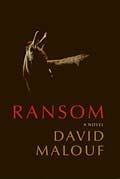Dozens of novels have been based on the Iliad, but Ransom takes a different approach than most. It condenses the battle scenes to the barest minimum in order to tell a more intimate story about the experience of grief and how, in its simplicity and universality, it can illuminate and change hearts.
Malouf assumes readers know the basic story of the Iliad. The siege of Troy has dragged on for years when the Greek champion Achilles, in a fit of pique because King Agamemnon has taken his captive woman, decides to sit out the fighting until Agamemnon gives her back. Alarmed by the impasse, Achilles' best friend goes out in his place to fight Hector, the Trojan champion, and is slain. In a towering rage, Achilles kills Hector and abuses his body by dragging it behind his chariot around the walls of Troy. Finally, Hector's father, King Priam, comes to the Greek camp and persuades Achilles to give up the body for honorable burial.
Ransom begins with a pensive Achilles, almost baffled by the turn his life has taken, trapped not only in his rage at Hector, but in a war unnatural in its length. The story soon shifts, though, to center on Priam, whose grief brings him to a shocking decision. Temporarily, he will abandon his duty to cultivate "his role as king, to think of the king's sacred body, this brief six feet of earth ... as at once a body like any other and an abstract of the lands he represents, their living map." He will visit Achilles as an ordinary father, unadorned and accompanied only by the humble carter who serves as his driver. The experience transforms him.
Deceptively short, Ransom is not a quick read. Malouf's poetic prose invites readers to slow down and enter its breathing spaces to fully appreciate its depth of meaning. (2009; 224 pages, including an Afterword discussing Malouf's sources and how he came to write the novel)




